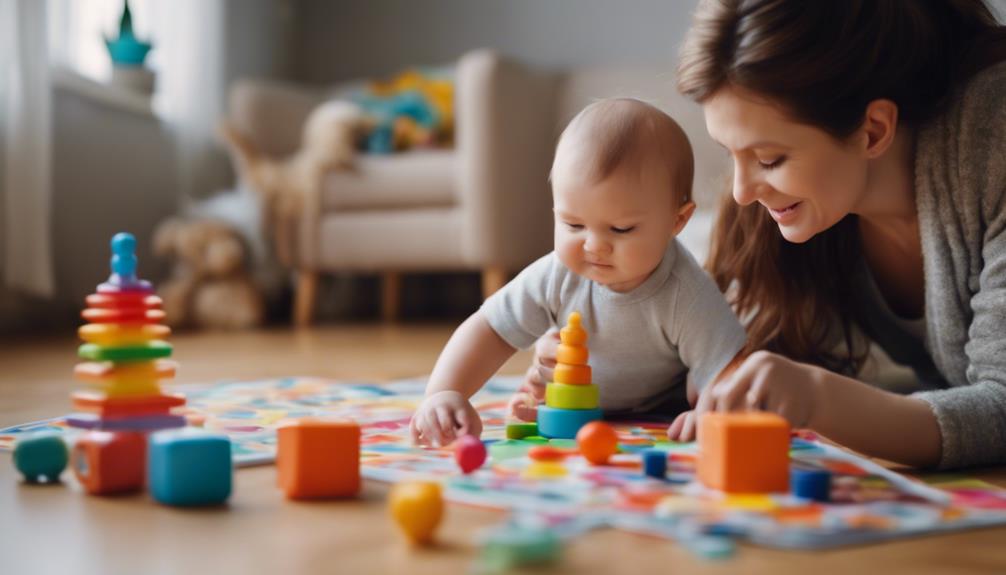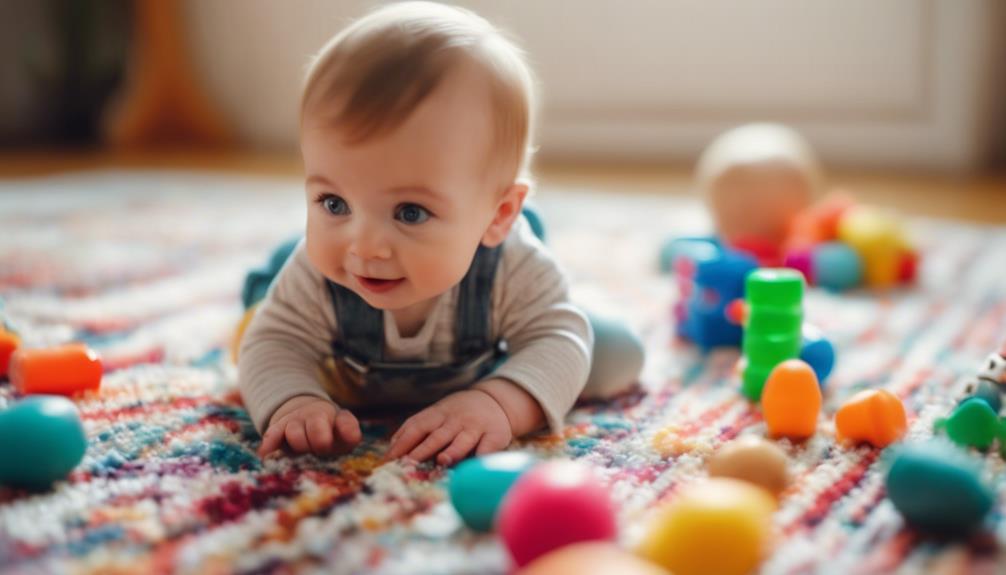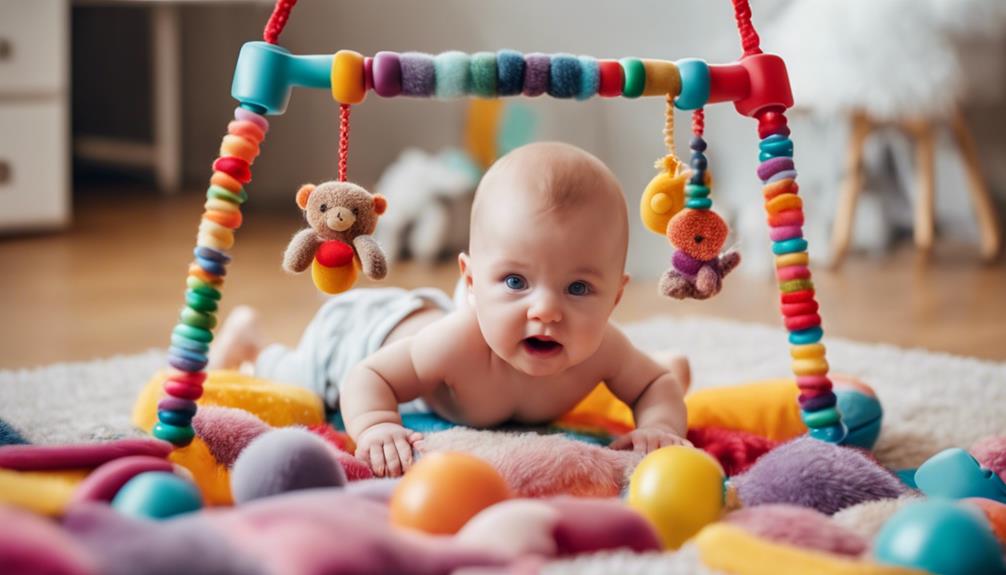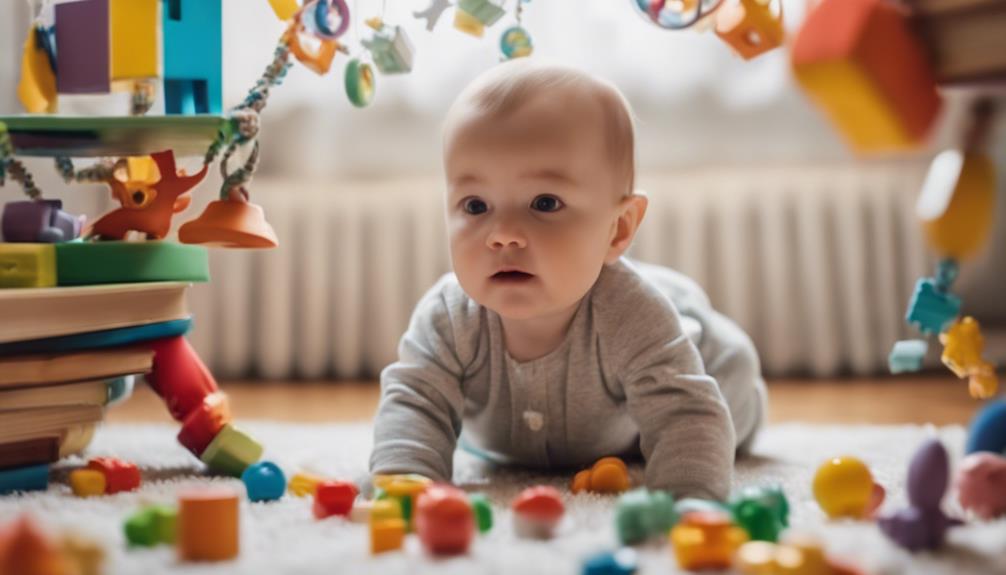To promote your baby’s intellectual development, engage in early language stimulation. Communicate with them daily and read out loud to enhance language skills. Foster curiosity with stimulating toys and hands-on activities. Form emotional connections through cuddling and responsive care. Provide cognitive stimulation through interactive play and language-rich interactions. Support brain development with activities like tummy time. Remember, a nurturing environment, positive interactions, and diverse experiences are crucial. By implementing these approaches, you are establishing a strong basis for your baby’s intellectual advancement.
Key Takeaways
- Engage in early language stimulation through talking, reading, and limiting screen time.
- Encourage curiosity with stimulating toys, hands-on learning, and problem-solving challenges.
- Nurture emotional bonds through cuddling, prompt responses, and a loving environment.
- Provide cognitive stimulation via interactive activities, sensory experiences, and age-appropriate toys.
- Support brain development with tummy time, free movement, varied activities, and daily routines.
Early Language Stimulation
Engage with your baby through early language stimulation to foster their intellectual growth and language development. Talking to your baby right from birth is essential as it helps them hear millions of words by the age of 5, greatly enhancing their language skills.
Additionally, reading to your baby daily not only supports language development but also fuels their imagination and strengthens the parent-child bond. Babies exposed to reading from infancy tend to develop better communication skills and a richer vocabulary by the time they reach the age of 5.
It's vital to mention that screen time should be avoided for babies under 18 months and limited to one hour a day for kids aged 2-5 to promote healthy language development. When screen time is inevitable, make sure to discuss and explain the content watched with your baby to enhance their language comprehension and critical thinking skills effectively.
Encouraging Curiosity and Exploration

To nurture your baby's intellectual growth, fostering curiosity and exploration is key. Encouraging curiosity can be achieved by providing a range of stimulating toys and engaging activities that appeal to different senses. Through hands-on learning experiences, your baby can explore their environment under safe supervision, aiding in their cognitive development. It's essential to offer age-appropriate challenges that prompt problem-solving skills and critical thinking. By creating a nurturing environment that supports exploration, you can instill a love for learning in your little one.
| Strategies for Encouraging Curiosity and Exploration | Benefits |
|---|---|
| Provide stimulating toys | Engages multiple senses |
| Offer hands-on learning opportunities | Promotes cognitive development |
| Encourage problem-solving skills through challenges | Develops critical thinking abilities |
Nurturing Emotional Bond

Establishing a strong emotional connection with your baby through cuddling and nurturing activities is essential for enhancing brain development. Responding promptly to your baby's needs and providing a safe and loving environment are key factors in nurturing this emotional bond.
By offering attentive care, you aren't only building trust but also fostering positive parent-child interactions that support healthy brain development in your little one.
Creating a space filled with emotional connections and physical touch helps regulate your baby's emotions, leading to a secure attachment and overall emotional well-being. Through these nurturing activities, you're laying the foundation for your baby's cognitive growth and intellectual development.
Providing Cognitive Stimulation

Creating a stimulating environment for your baby involves incorporating interactive activities and age-appropriate stimuli to foster cognitive development. Engage in activities like reading aloud, singing songs, and playing games to stimulate brain development.
Introduce age-appropriate toys and sensory experiences to encourage exploration and problem-solving skills. Provide a nurturing environment that fosters curiosity, creativity, and critical thinking in babies.
Encourage hands-on learning through activities that promote sensory exploration, cause-and-effect understanding, and spatial awareness. Incorporate language-rich interactions, positive reinforcement, and exposure to new concepts to enhance intellectual growth in babies.
Physical Activity and Brain Development

Engaging in physical activities plays a vital role in promoting brain development in babies, contributing immensely to their cognitive and physical growth. Physical activity, such as tummy time and free movement, is essential for infants as it supports their cognitive development and helps them explore their surroundings effectively. According to WHO recommendations, restraining babies for extended periods can hinder their learning and development. Infants under 1 year old require multiple opportunities for physical activity daily to respond to stimuli and promote brain development adequately.
To guarantee optimal cognitive and physical growth, varied physical activities should be integrated into babies' daily routines. These activities not only stimulate brain development but also encourage learning and exploration. Limiting a baby's movement can restrict their ability to fully engage with their environment, potentially impacting their overall development negatively.
| Physical Activity | Benefits |
|---|---|
| Tummy Time | Supports cognitive development |
| Free Movement | Encourages exploration |
| Varied Activities | Stimulate brain development |
| Daily Routines | Facilitate learning experiences |
| Respond to Stimuli | Enhance cognitive and physical growth |
Creating Stimulating Environment

To promote your baby's intellectual growth, make sure they're surrounded by a stimulating environment that encourages exploration and cognitive development. In this nurturing environment, you can foster your child's development by incorporating various strategies:
- Provide a rich sensory environment with different textures, colors, and sounds to stimulate your baby's brain development.
- Incorporate age-appropriate toys and activities that encourage exploration, problem-solving, and creativity.
- Create a safe and nurturing space that promotes curiosity, independence, and learning through hands-on experiences.
- Offer a variety of stimuli such as music, books, and interactive play to engage your baby's senses and encourage cognitive growth.
- Establish a routine that includes time for play, interaction, and exploration to foster intellectual development in a stimulating environment.
Positive Behavior Modeling

Establishing positive behavior modeling is key to shaping your baby's social interactions and emotional development. Babies learn by observing the actions of those around them, so demonstrating kindness, empathy, and effective communication lays a strong foundation for their social and emotional skills.
When parents exhibit patience, respect, and problem-solving abilities, they provide a blueprint for their baby's behavior to follow. Children often mimic the behaviors they see, making positive role modeling essential for guiding their actions towards healthy relationships and conflict resolution.
Consistent and positive behavior modeling not only helps babies understand appropriate social interactions but also aids in their emotional regulation. By showcasing positive traits and actions, parents can help their baby develop important skills for maneuvering social situations and managing emotions effectively.
Frequently Asked Questions
How Can You Help an Infant Develop Intellectually?
To help an infant develop intellectually, engage in interactive activities, provide age-appropriate toys, encourage physical activity, create a nurturing environment, and model positive behaviors. These strategies promote cognitive, emotional, and social growth, laying a strong foundation for lifelong learning.
How to Improve a Baby's Intelligence?
To improve your baby's intelligence, engage in interactive activities like reading and talking. Create a nurturing environment that fosters exploration. Encourage physical play for brain development. Limit screen time and prioritize real-world interactions. Foster independence and a love for learning.
What Activities Make Babies Smarter?
Engaging in interactive reading, providing physical activities like tummy time, encouraging social interactions, limiting screen time, and eating meals together as a family all help make babies smarter. These activities support cognitive, emotional, and social development.
How to Conceive a High IQ Baby?
Want to conceive a high IQ baby? Start by choosing your genetic lottery numbers wisely. Remember, intelligence isn't just about genes; it's a mix of factors. Prioritize prenatal care, stimulating activities, and a nurturing environment.
Conclusion
To sum up, by incorporating these strategies for intellectual growth in your baby's daily routine, you're effectively fostering a genius in the making!
So keep up the good work, and observe as your little one blossoms into a brilliant mind before your very eyes.
Remember, it's never too early to start nurturing their intellectual development for a bright future ahead.










